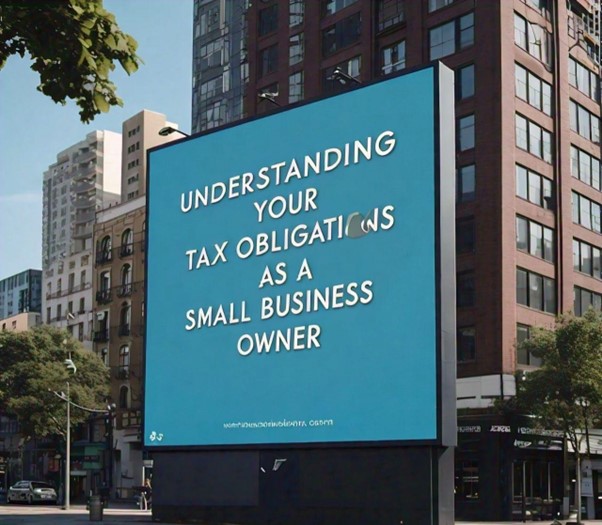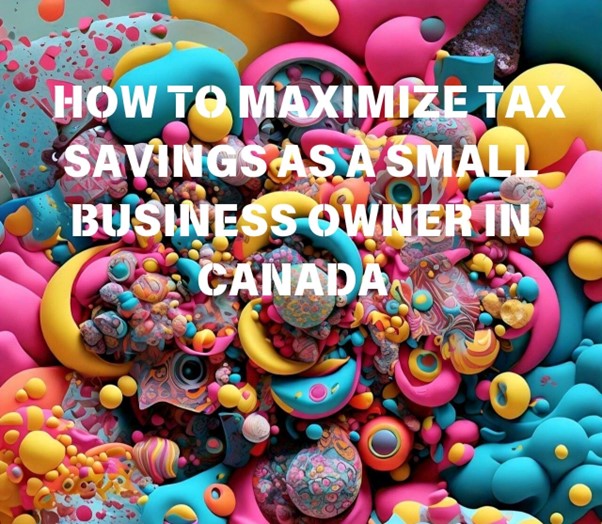HOW TO MAXIMIZE TAX SAVINGS AS A SMALL BUSINESS OWNER IN CANADA: 5 TAX SAVINGS STRATEGIES FOR SMALL BUSINESS OWNERS
As a small business owner in Canada, managing your finances and minimizing your tax liability is crucial to the success of your business. With the right strategies and expert advice, you can maximize your tax savings and invest more in your business. In this article, we’ll provide practical solutions to common pain points and offer expert advice from a Canada tax expert and financial advisor in Ontario.
UNDERSTANDING YOUR TAX OBLIGATIONS AS A SMALL BUSINESS OWNER

As a small business owner in Canada, you’re required to file a corporate tax return (T2) and report your business income and expenses. Here are some key tax obligations to keep in mind:
- Register for a GST/HST Account: If your annual revenue exceeds $30,000, you’re required to register for a GST/HST account.
- Obtain a Business Number: You’ll need to obtain a business number from the Canada Revenue Agency (CRA) to file your taxes.
- File Your Tax Return: You’re required to file your tax return by six months after the end of your fiscal year.
COMMON PAIN POINTS FOR SMALL BUSINESS OWNERS
As a small business owner, you may experience the following pain points when managing your taxes:
- Tracking Expenses: Keeping track of expenses can be time-consuming and overwhelming, especially if you have multiple income streams.
- Determining Business Use of Home: Calculating the business use of your home can be complex, especially if you work from home occasionally.
- Claiming Deductions: Knowing what deductions you’re eligible for can be confusing, especially if you’re new to business ownership.

PRACTICAL SOLUTIONS FOR SMALL BUSINESS OWNERS
Here are some practical solutions to common pain points:
- Use Accounting Software: Utilize accounting software like QuickBooks or Xero to track your expenses and income.
- Keep a Logbook: Keep a logbook to track the business use of your home, including the number of hours worked and the square footage used.
- Consult a Tax Professional: Consult with a Canada tax expert or financial advisor in Ontario to ensure you’re claiming all eligible deductions.
TAX SAVINGS STRATEGIES FOR SMALL BUSINESS OWNERS

Here are some tax savings strategies to help you minimize your tax liability:
- Claim Business Expenses: Claim all eligible business expenses, including home office expenses, travel expenses, and equipment expenses.
- Incorporate Your Business: One of the most effective tax-saving tips for small businesses is incorporation, if your business produces more profit than you need to live on. It could produce a sizeable tax deferral by qualifying for the lower small business tax rate for active income. This deferral benefit, however, is only available if the profits are left in the company.
The longer the profits are left in the company, the larger the tax deferral. It’s important to note, however, that investment income earned on prior deferrals and rental income don’t receive this lower rate.
3. Take Advantage of Tax Credits: Take advantage of tax credits, such as the Scientific Research and Experimental Development (SR&ED) tax credit.
4. Consider Incorporating: Consider incorporating your business to take advantage of lower corporate tax rates.
5. Maximize Tax Breaks from RRSPs: In order to make the maximum allowable registered retirement savings plan (RRSP) contribution next year, you’ll need to create the contribution room this year by maximizing reported earned income. If incorporated, you will want to review the best dividend/salary mix for your situation.
As part of your overall plan, you may also want to make a contribution to your tax-free savings account (TFSA). It’s important to achieve a balance in your personal investment plan to ensure that it fits in with this year’s maximum contribution limits for business owners.
FREQUENTLY ASKED QUESTIONS
Here are some frequently asked questions about taxes for small business owners in Canada:
- What is the deadline for filing my corporate tax return?
A: The deadline for filing your corporate tax return is six months after the end of your fiscal year.
2. Can I claim my home office expenses as a business expense?
A: Yes, you can claim your home office expenses as a business expense, but you’ll need to calculate the business use of your home.
3. What tax credits are available to small business owners in Canada?
A: There are several tax credits available to small business owners in Canada, including the SR&ED tax credit and the Apprenticeship Job Creation Tax Credit.
CONCLUSION
Managing your taxes as a small business owner in Canada can be complex, but with the right strategies and expert advice, you can minimize your tax liability and maximize your tax savings. By understanding your tax obligations, addressing common pain points, and taking advantage of tax savings strategies, you can invest more in your business and achieve your financial goals. Remember to consult with a Canada tax experts or financial advisor in Ontario to ensure you’re taking advantage of all eligible tax savings.
BOOK A CONSULTATION
If you’re a small business owner looking for expert tax advice, book a consultation with our team of experts . We’ll provide personalized guidance and support to ensure you’re meeting your tax obligations and minimizing your tax liability.
CONTACT US
Phone: (647)643-1095
Email: sjohn@glhaccounting.ca
Address: G.L.H. Accounting Services
105 Hansen Rd N, Brampton, ON L6V 3C9.
FOLLOW US
Instagram: GLHACCOUNTING
LinkedIn: glhaccounting
By seeking expert advice and staying informed, you can navigate the complex world of tax filing with confidence. Book a consultation today and take the first step towards minimizing your tax liability and maximizing your tax savings.
ABOUT AUTHOR
Shanel John is a dedicated Certified Public Accountant (CPA) at G.L.H. Accounting, specializing in Income Tax with over 10 years of experience. Based in Brampton, Ontario, Canada, Shanel offers expertise in tax preparation, financial accounting, and advisory services. A certified QBO Pro Advisor, Shanel’s decade-long experience and knowledge make her a trusted figure in the accounting field.

